Essay (verb): to try.
Illustrations by Natalya Bolnova
Herbert Sets Sail
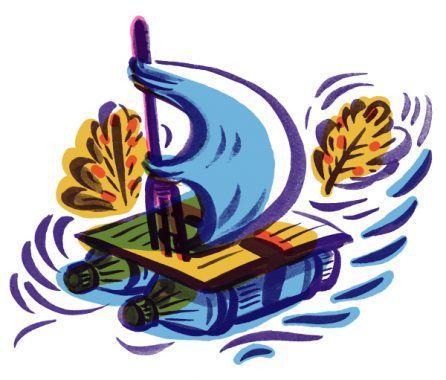 What a rude branch. That was my first thought as I walked away from our family’s 13th annual boat race, once again empty-handed. The evil root somehow stole Herbert and my much-anticipated moment of victory.
What a rude branch. That was my first thought as I walked away from our family’s 13th annual boat race, once again empty-handed. The evil root somehow stole Herbert and my much-anticipated moment of victory.
Herbert was what I named my skillfully engineered boat because, let’s face it, who doesn’t want a boat named Herbert? After 13 years of attempting to make the perfect contraption, I thought he was it. I crafted a motor out of a milk carton and rubber band, and a sail out of a fork and plastic bag to catch all wind energy possible. I gave Herbert a fin to help guide him through the troubled waters. He had two water bottles as a base and one rock in each to keep him from flipping on the starting 10-foot drop. I coated him in duct tape to ensure he did not fall apart, and decorated him with Sharpies so that the other boats would pay attention to his perfection rather than the race at hand.
My 19 cousins, 14 aunts and uncles, and I have competed in this race during our weeklong family reunions every year since 2003. The uncles conceived the idea one day when the massive number of children wandering around needed some source of entertainment. The rules established that everyone must create a boat out of recycled material from the campsite and then drop their creation from a bridge into a creek; whoever’s boat made its way down the creek and into the lake first would win.
In 2003, as a 4-year-old, I decided to use a paper cup with a leaf and a stick stabbed into it. As soon as I catapulted this boat off the bridge, I learned that a leaf and stick do not make for a proper sail, that paper and water do not play well together, and that tape is most definitely a necessity. My other most valiant and slightly depressing efforts over the course of the next 12 years included a miniature water bottle taped into a paper cup, a bottle with a balloon attached to the end, and a Ziploc bag with a sail that was daintily taped to the top. Despite all these misses, I kept trying. As my cousins began to simply throw water bottles off the bridge to see whose would miraculously make it across the finish line, I never stopped attempting to create the perfect, winning boat. Throughout my life, I have loved experimenting and inventing, never stopping to think that one of my off-the-wall ideas was impossible. My mind works differently from others; when given the space, it generates multiple concepts and analyzes all of them to come up with the best solution. This race gave me my favorite type of freedom, complete liberty to use my wacky imagination to create anything in the world, and I loved every minute of it.
This freedom is what led me to Herbert. I had been thinking about him nonstop during the school year. I took into account all of my hits and misses of the past 13 years and began constructing him that fateful Tuesday morning. This was it. As every one of my cousins threw their plastic pieces as far as they possibly could, I carefully dropped Herbert from the bridge so that he would not land upside down in the water. I watched him drift down the creek, then ran to the lake entrance to await his arrival. After 20 minutes and multiple water bottles crossing the finish line, I discovered a branch had gotten in the way of our victory. Although a bit salty, I was not disappointed.
I had accomplished everything I wanted because I had done something I loved; I invented Herbert the masterpiece.
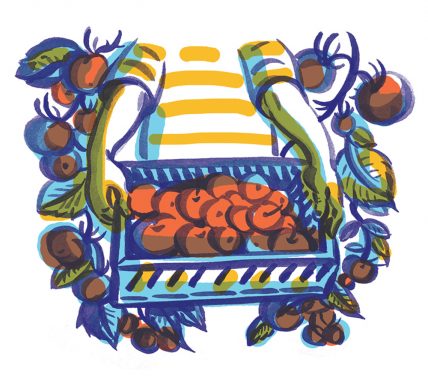
Family Heirlooms
Turning off a well-worn path, I step into the tall grass. Fighting my way through brambles and weeds, I ascend the hill. As the field comes into focus, my stomach sinks. What used to be neatly separated rows of edamame plants is now a jungle of weeds. Almost all evidence of my hard work under the scorching sun of rural Kentucky has disappeared. Johnson grass and pigweed have exploded and overpowered the edamame along with my dignity. The weeds have finally won the war. Why didn’t I take that job at the hardware store?
The fight lasted three months. My brother and I battled deer with fishing-line fences strung with aluminum cans but couldn’t keep them from devouring tender edamame seedlings. We squashed hundreds of metallic green Japanese beetles between our fingers as they feasted, turning the leaves lacy and transparent. Long hours of work and gallons of sweat had been poured into this crop. Our plan was to sell organic edamame to restaurants and make a ton of money. The few plants spared by the deer and beetles had now been defeated by the weeds. Knowing we were beaten, we mowed the field.
As we cleaned up, we noticed a few tomato plants left over from our church fundraiser. They were thriving with little care in the torrid climate of “Little Sahara,” the nickname my great-grandfather gave to this farm.
That winter, we researched the tomato market. We learned organic heirloom tomatoes command a much higher price than hybrid tomatoes grown with herbicides and pesticides. Even though growing heirlooms meant our tomatoes would not resemble the perfect spheres at Kroger and going organic meant more weeding, we decided to take the risk.
We built an electric fence to deter deer. Paper mulch and hoes were our weapons to combat weeds. We developed a system for supporting tomato vines and planted rows wider than our rototiller so it could pass safely. This time we were determined not to be beaten. By the end of July, our months of hard work were yielding results. We now faced a new challenge: selling. We sent out blast e-mails, put flyers in mailboxes, created a website, made business cards, and started cold-calling restaurants.
As I slowly punched in the phone number, pessimistic outcomes swirled in my mind. What if the chef has already contacted a tomato vendor? Will a restaurant trust a teenager? Despite my lack of confidence, I clicked the green call button and made my pitch. They weren’t interested. I got used to the rejections, but I kept calling.
Finally, we caught a break. “Stop by the restaurant, and we’ll look at what you have.” In 20 minutes we were standing in a sweltering kitchen. The cooks wore bandanas to keep sweat off their faces. We hoisted three overflowing crates of heirlooms onto the stainless-steel counter so the head chef could examine them. After he tasted a few cherry tomatoes, he nodded. He would buy them all.
My brother and I played it cool until we got in our car. Then we celebrated. A top chef wanted our tomatoes for his restaurant. It was exhilarating, even better than cashing the check. I’ll never forget him saying, “We’ll hit you guys up again next week.” From there, our business took off. Chefs were texting for more orders, and soon Jelsma Brothers tomatoes were featured on menus in gourmet restaurants across the city.
Many times I doubted my decision to turn off the well-worn path and start a new business. Working at the neighborhood hardware store certainly would have been easier. In retrospect, forging my own way was more satisfying than scoring a game-winning goal or nailing a saxophone audition. My reward has been confidence. Knowing I can take a risk, compete in the business world, and prevail.
FUELED BY MY PARENTS’ SACRIFICES
It is almost midnight when Papi comes through the door, gray hairs surrounding the creases that enveloped his face. He sets his Bible on the dining table and rummages the kitchen for food. His bones are so sore that he cannot even sit to eat. I hear him walking up the stairs, each step creaking under the pressure of his weight. I make my way to the kitchen to get a glass of water; the oven clock reads 1:32 a.m. In the darkness, his body is a shadow on the couch. “Bendicion, Papi,” I mutter and give him a kiss on the head. I pull a blanket over him; he squirms, but his eyes remain shut.
This routine has been both a source of comfort and concern to me. Knowing that my parents work these strenuous hours, just to give me the opportunities they were denied themselves, fills me with pride and duty. A duty to make their lives easier. I cannot count how many times my parents have told me stories about their youth. Stories of owning no more than one pair of battered pants and stories of traveling by foot for hours just to get to school. In truth, their past is the fuel for my commitment to my schooling. Currently, my father’s clothing, a ragged patchwork, pales in comparison to the wardrobe in my room. My mother, too, had been denied the opportunities given to me through my education because of her reluctant decision to abandon school and work to pay her sister’s college tuition — such a great sacrifice. Their daily toil forces me to strive for the future they never had. This has allowed me to become deeply empathic and committed to reforming our family’s current circumstances as I continue to witness the embodiment of what hard work looks like.
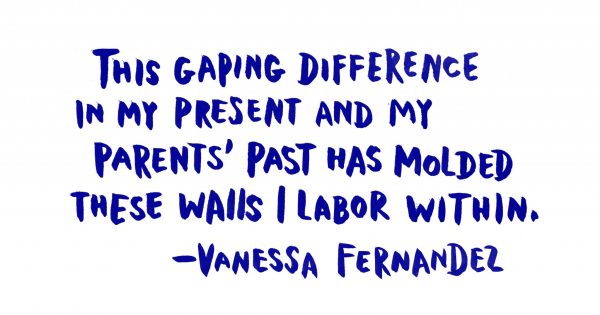
I have confined myself between four walls at school and at home because, for me, there is no room for failure. Sometimes, those walls threaten to crush me because of the insurmountable workload, but then I think of my father. I cannot imagine a greater gift than the gift of freedom. Freedom from chasing financial security to the detriment of his health. Freedom from sacrifices that break men’s souls. This gaping difference in my present and my parents’ past has molded these walls I labor within. It has become part of who I am. The drive for academic excellence and pursuing my passion of becoming a medical doctor. The only way I can make my escape is by pulling myself upward with my parents right by my side. These walls force me to take advantage of the education I am offered and do nothing but excel.
Since childhood, I have been engrossed in ensuring a prosperous future for myself and my family. My goal is to pay back my parents for all the hard work and sacrifice they encountered to ensure that I graduate high school and enroll in college. I can call myself accomplished the day I do not have to watch my father rush down a handful of pain pills before he leaves for work. The day I can guarantee that what they did was not in vain. That is how I will say thank you. My father’s ambition and my mother’s drive have instilled in me the values of hard work, dedication, and a sense of honor and a charge to give back to my family and community. My success so far did not happen because of my singular effort, rather, it took a village of teachers, advisers, and most importantly, mi familia. I will not let them down.
THE GREAT ESCAPE
Five thousand million miles away from Earth on board the starship Enterprise, I look at the thousands of white dots that make up the galaxy; a sense of peace and calm flows through me. What wonders lie ahead of me in this vast unknown? Suddenly, the ship rocks violently, a scream of “E DECK HAS BEEN BREACHED” blares over the intercom. We are under attack by an unknown enemy! “Prepare all decks for battle,” I yell, buckling myself into the nearest seat. I look out the window expecting to see the enemy ship, but all I see is a pair of eyes gazing back at me.
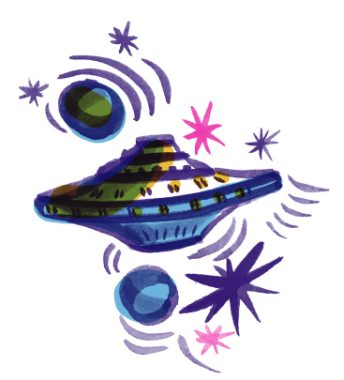
Reality comes crashing through; I am in my backyard in Saratoga, Calif. My cousin Monica is looking at me through the living-room window, pointing and laughing. “Wow, Nikhil, I thought you would have outgrown that,” she said. “That” being crazy me, talking to myself, jumping from one place to the other, flailing my arms, lost in my thoughts. Ever since I can remember, I’ve escaped to this world of mine, filled with superheroes, dragons, and starships. Unfortunately, most of my family thinks I am crazy. In fact, when I was 7, my mom made me talk to a therapist to figure out if “my walks in the backyard” were normal.
But no one else knows about my crazy “walks,” as they are so unlike me. Most of the time I deal in concretefacts and figures in the fast-paced world of policy debate. You will find me hunched over my laptop squintingat the screen. Articles about the South China Sea conflict, Arctic environmental cooperation, and the benefits of granting China market economy status flash across my monitor. My brain is working in hyperdrive as I rush to find all the necessary articles, frantically type out robust explanations, and try to find ways to frame all of these facts perfectly. Debate is the pinnacle of objectivity; it values concrete facts over abstract dreams, every statement made has to be backed up by qualified sources, and every creative suggestion falls to the devastating question, “where’s your evidence?”
My role as a fact-driven policy debater may be at odds with the quirky imaginative daydreamer, but that’s me. I refuse to fit into any mold or stereotype. I love politics and history, but I am also intrigued by science fiction and fantasy. I am not one-dimensional. Tapping into my imagination while staying grounded in facts and figures helps me create something really special. While these qualities may seem like polar opposites, they work for me. Whether it’s saving the human race from evil aliens or debating a policy that elevates millions out of poverty, I can create a world where I truly shine. With creativity and objectivity in hand, I can “boldly go where no man has gone before.”
COFFEE BREAK
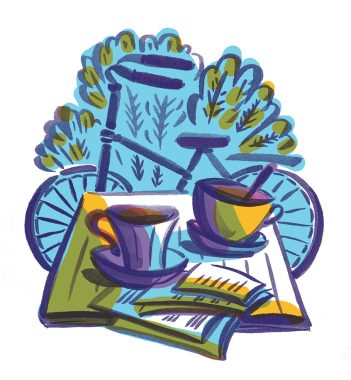 It was late afternoon in Hanoi. Cool wind blew softly, carrying the soothing fragrance of fresh-ground coffee from the cafés along the roadside into the cold winter air, and heartwarming music from the restaurants blended into the fragrance and filled the gap in anyone’s cold winter hearts. Yet, I was sweating, struggling to pedal my broken e-bike home as quickly as I could. “Isn’t the sunset beautiful?” said Dung, my friend of many years, who eagerly accompanied me even though, unlike me, her battery hadn’t mysteriously run down. “Maybe we should do this once in a while.”
It was late afternoon in Hanoi. Cool wind blew softly, carrying the soothing fragrance of fresh-ground coffee from the cafés along the roadside into the cold winter air, and heartwarming music from the restaurants blended into the fragrance and filled the gap in anyone’s cold winter hearts. Yet, I was sweating, struggling to pedal my broken e-bike home as quickly as I could. “Isn’t the sunset beautiful?” said Dung, my friend of many years, who eagerly accompanied me even though, unlike me, her battery hadn’t mysteriously run down. “Maybe we should do this once in a while.”
I watched the sun sink lazily below the horizon, spreading its colors over Hoan Kiem Lake, but rather than the beauty Dung had seen, I saw it as a pernicious clock, mocking me as my precious study time leaked away. Tons of homework, then a math test, then a psychology club meeting. Although I loved discussing profound psychological problems, or solving those enigmas called equations, the thought was tiring. “Another cup of coffee,” I thought sadly to myself, “another sleepless night.”
“Sure,” I told Dung, noncommittally, and tried to pedal faster while she made comments about every shop and restaurant that we passed. Nothing seemed to slip her eyes.
Suddenly, she stopped her bike. “Have a break? This shop makes great coffee.”
I smelled the Vietnamese coffee, a scent so tempting and intimate that it almost made me cry. I wanted nothing more than to have a cup of coffee with her — it had been so long since we’d really done anything together — but something stopped me. “Uh,” I found myself saying, mechanically. “I’ve got so much homework. I shouldn’t waste my time.”
She shrugged, and we continued in silence. As the smell of coffee receded farther and farther into the distance, I started feeling guilty and gained a new respect for Dung. She had the same amount of work that I had — as anybody had — but she had still happily made time for me. Back home, looking at the piles of homework on my desk, I sighed. Attending the most competitive “gifted” school in Vietnam — where parents dream of sending kids to and where kids feel forced to constantly justify their placement — we view high school as nothing more than preparation for college, and I suddenly became afraid that college would seem like nothing more than preparation for my career. “Perhaps Dung was the only one of us to get it right,” I told myself: There is beauty not to be missed, moments not to be ignored, and friends not to be abandoned.
“Hey, Dung,” I asked the following morning. “Do you want to ride from school together again today?”
“Your battery still not working?”
“No. I fixed it. I just wanted to have a cup of coffee with you.”
After school, two steaming cups of coffee in front of us, she told me how lonely she had been after her recent class transfer. I’d been lonely, too, I realized, too wrapped up in my studies and in my inner world. However, watching the sunset with my friend, I finally realized that taking an hour-long “vacation” from myschoolwork doesn’t mean I am escaping from it, and it doesn’t mean I’m lazy. All it means is that I want to live my life to the fullest and cherish what I now have while reaching for the future.
Returning home that afternoon, for the first time in months I didn’t feel tired. I finished my homework more productively than ever, got six full hours of sleep, and woke up the next morning refreshed, ready to conquer any tricky math questions or mysteries of the human brain. I sensed an overwhelming energy running through my body as I thought about how future is shaped by present, looking forward to seeing Dung again and to another day of school.
Welcome, Class of 2021!
Top ’21 Tidbits
86 international students
55 have parents or grandparents who attended Colgate
Farthest hometown: Melbourne, Australia (10,307 miles away!)
Collectively, they have lived more than 5.1 million days
774 first-years
30% self-identify as multicultural students
Citizens of 21 countries (including the United States)
From 40 states and the District of Columbia
13 came from Colorado

